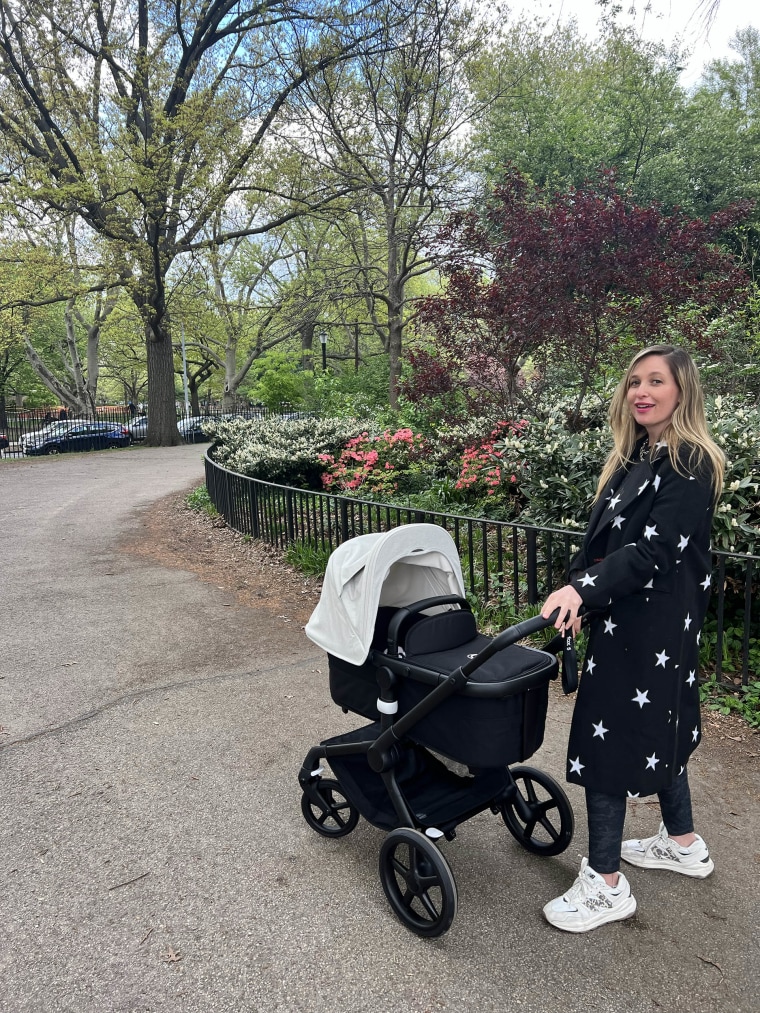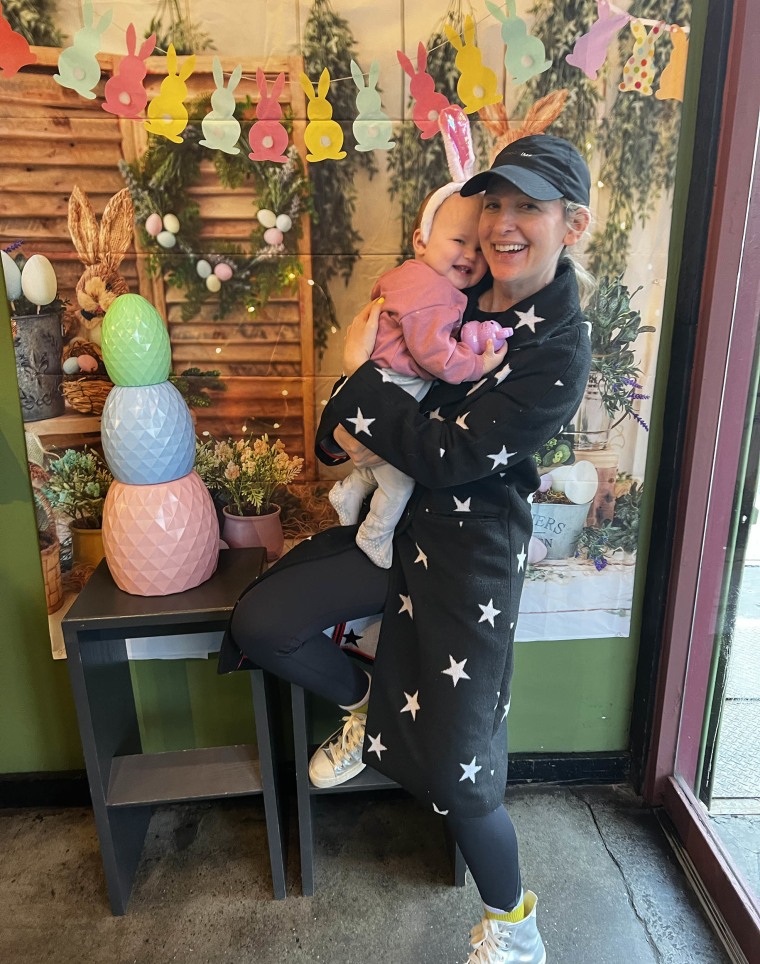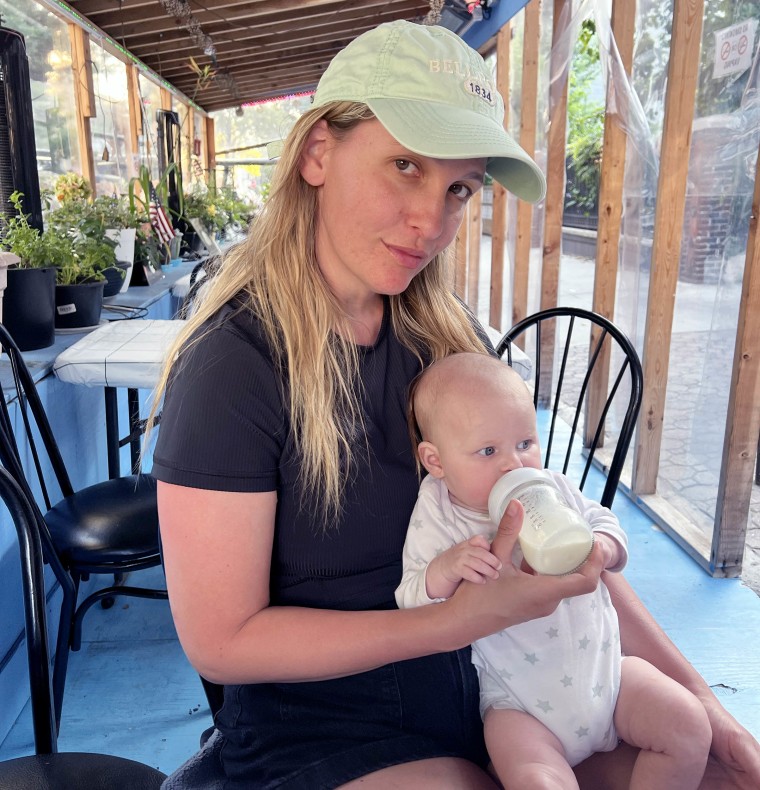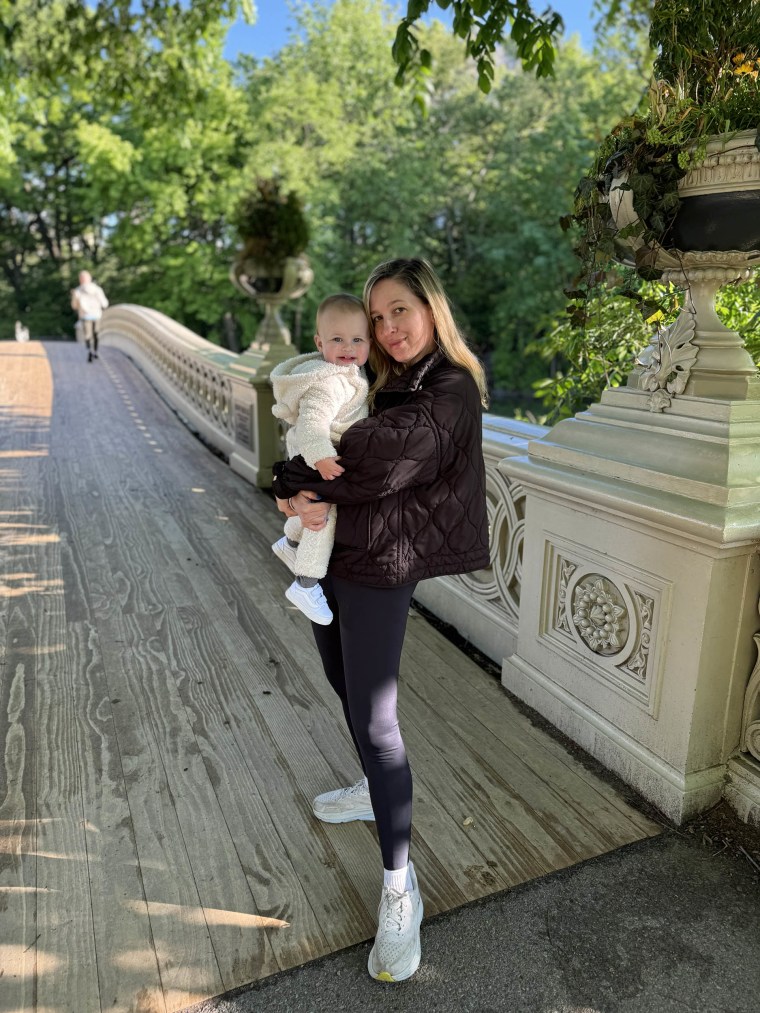I lied to the first person who asked me if I had postpartum depression.
Four days after giving birth, I was sitting on a chair in the pediatrician’s office, holding my crying newborn, who was there for her first visit. I was barely able to stand. My body was sore, bleeding and tired. My thoughts were sloppy and my speech was delayed. The nurse greeted us and handed me an iPad without explanation. I looked down and saw a postpartum depression survey. The questions felt like tricks.
Have I been anxious or worried for no good reason? Of course I have. I’m trying to keep my newborn alive and I have no idea what I’m doing.
Have I felt sad or miserable? Yes, but I have felt other things too.
Have I been able to laugh and see the funny side of things? I thought back to the night before when my baby refused to latch onto my breast and wouldn’t eat for eight hours. My husband and I paced around the apartment wondering if we should bring her to the hospital. No, I wasn’t able to see the funny side of things.
Have I blamed myself unnecessarily when things went wrong? How could I not? When my baby cried, it felt entirely like my fault.

I looked up at my baby. I started to get paranoid that if I answered these questions honestly, they’d take her away from me. I changed all of my answers so I could come across like a new mom who was coping well. I fooled everyone. The pediatrician commented on how well I was doing. Her praise encouraged me to continue to lie, and I became very good at doing that in the weeks that followed.
Postpartum depression grew on me, silent and invisible. It started with frequent mood swings, random tears and moments of anger toward my husband. It evolved fast. I found myself refusing to answer calls or text messages from friends or family. I obsessed over how I felt like the worst mom and questioned whether my baby even loved me. I couldn’t shake the guilt that I had over decisions I made in labor or how I couldn’t breastfeed because my nipples were in too much pain. I was depressed, anxious and beginning to show OCD-like symptoms around allowing anyone to care for the baby unless I was right there beside them.
My husband and I didn’t know much about postpartum depression before it consumed me. He witnessed what I was going through but assumed it was normal. I don’t blame him for that. I was pretending it was normal too. I feared if I told him differently, he’d turn on me and take the baby away. I know now he’d never do something like that, but back then my thoughts haunted me without glimmers of clarity.
More about postpartum depression and how to get help
- Rachel Goldberg, a licensed therapist who specializes in postpartum depression, says symptoms aren’t always obvious, because many of the emotions seem common when bringing home a new baby.
- “Postpartum depression symptoms aren’t always constant and can be mixed in with positive feelings or moments of intense love that deceive people into thinking all is well,” Goldberg said.
- Goldberg explained that postpartum depression often creeps up slowly, with changes in mood and behavior, such as withdrawing from social interactions, feeling inadequate, feeling extreme irritability, feeling dread about responsibilities, being overly anxious and/or having catastrophic thinking.
- Goldberg shared that it’s important for partners to be attentive and look for common postpartum depression indicators, such as unusual mood swings, giving brief responses or displaying indecisiveness.
- If you or someone you know is struggling, try the Postpartum Support International helpline at 1-800-944-4773; immediate help is available by calling or texting 988 or chatting at 988lifeline.org.
In my case, postpartum depression was easy to hide. I avoided most of my friends and family, so they didn’t know. Neighbors would ask me if I was loving every second of being a new mom. Lying was easy if I responded with the word yes. At my six-week postpartum checkup with the gynecologist, I hoped she’d be the one to help. I was in the middle of filling out the postpartum depression survey with honest answers when she walked in, grabbed it out of my hand, and threw it in the trash.
Fooled by my smile, she figured I was OK and that the survey was a waste of my time. I should have corrected her and spoken up. But her assumptions made me more embarrassed to admit that I was struggling. I retreated more into the lie.

The only person who was able to get through to me during this time was a friend who lived a few blocks away. She was a mom of two and asked to support me during my postpartum journey with a three-point check-in system. She would call me, text me and see me in person every week.
At around six weeks, she confessed she was worried about me. She had noticed my mood lingering in a melancholy state. I mentioned I hadn’t eaten a full meal in about four days and refused to talk to her about my baby’s sleep or health because I was superstitious that any words I said out loud would jinx the future. For example, I feared that if I told her my baby was healthy, the next day she’d come down with a fever and be hospitalized. Instead, I asked her to only talk about surface-level topics that didn’t give me anxiety.

My friend had struggled with postpartum depression and knew what to look for. When she asked me if I had postpartum depression, I didn’t know how to answer her. I knew that I was feeling a lot of heavy, dense and strange things. Rather than tell her the whole truth, I told her I’d be open to getting help. She recommended a few simple steps based on her own experiences.
1. Find a Therapist Who Specializes in Postpartum Depression
The thought of finding a therapist seemed daunting. My friend took the first step for me. She went on Psychology Today, searched for therapists with a postpartum speciality who took my health insurance plan, and sent me a list of five. She wrote me a script that I could copy and paste to send to each person. Within a week, I had an appointment scheduled.
Here’s the script that my friend wrote for me (feel free to borrow it):
My name is Jen Glantz. I am reaching out because I came across your profile on Psychology Today and saw that you specialize in postpartum depression. I’m looking to work with someone who can provide a safe and supportive environment for me to explore and process what I’m feeling as a new mom.
Could we please schedule a time to have a brief phone call to discuss your approach to therapy and see if working together feels right.
I look forward to hearing from you soon.
2. Speak With Other New Moms
I felt comfortable talking to my friend because she shared her own experience with postpartum depression and made me feel less alone. While I had ghosted most of my other friends and family, I started to recognize that I didn’t want to feel lonely, I just wanted to be surrounded by people who understood me. My friend shared three postpartum support groups that she had gone to in the past. One was virtual and the other two were local. I started going once a week to an in-person group.
I didn’t speak much when I was there, but I was able to meet other new moms. I enjoyed the group because it made me feel seen. This helped me stop lying about what I was experiencing, first to the people in the group, and later to friends and family.

3. Ask for Help
Eventually, my friends and family grew worried. When I wouldn’t respond to them, they would reach out to my husband, whom I begged to help me hide what I was going through. He would tell them that I was busy and overwhelmed. He told them we’d reach out soon to make plans. But when I was around three months postpartum, with the help of therapy and support groups, I decided to let people know what I was experiencing and ask them for help.
I brainstormed a few actionable ways they could help. I asked a cousin I am close to if she could come over on Wednesdays to sit with the baby while I privately spoke to my therapist in the other room. I asked a friend who lived nearby if she would be willing to go on outdoor walks with me once a week, because I needed the motivation to get outside.
Asking for help isn’t easy, especially when you are struggling. Rachel Goldberg, a licensed therapist who specializes in postpartum depression, shared a script that you can use to tell with loved ones that you are going through a tough time as a new parent and could use their help.
Hi _____,
I wanted to reach out because I’ve realized I may have seemed a bit different or more withdrawn lately. I’ve been finding it challenging to adjust to all the new changes of being a new mom, but I feel ready to open up more about it with you. I believe opening myself to more support could be beneficial. Are you available to (chat on the phone, come over, go for a walk with me... etc.) sometime soon?

How to Help a Friend With PPD
If you feel like someone you know might be experiencing postpartum depression, Goldberg recommended the script below to use as a way of reaching out to them.
I’ve been thinking about you a lot lately and wanted to check in. I’ve noticed that you haven’t been your usual self and might be going through a tough time. I want you to know that I care about you deeply, and I’m here to support you in any way I can. If you ever feel like talking about what’s on your mind or need help finding the right support, please let me know.
Even though I have a lot of friends and family members, I was able to fool them. I was able to sneak past health care professionals who didn’t make me feel safe enough to really open up about my struggles. I am grateful that I had one person in my life familiar with postpartum depression symptoms who could understand what I was going through. Without her, I don’t know when I would have found the strength to reach out for help.










